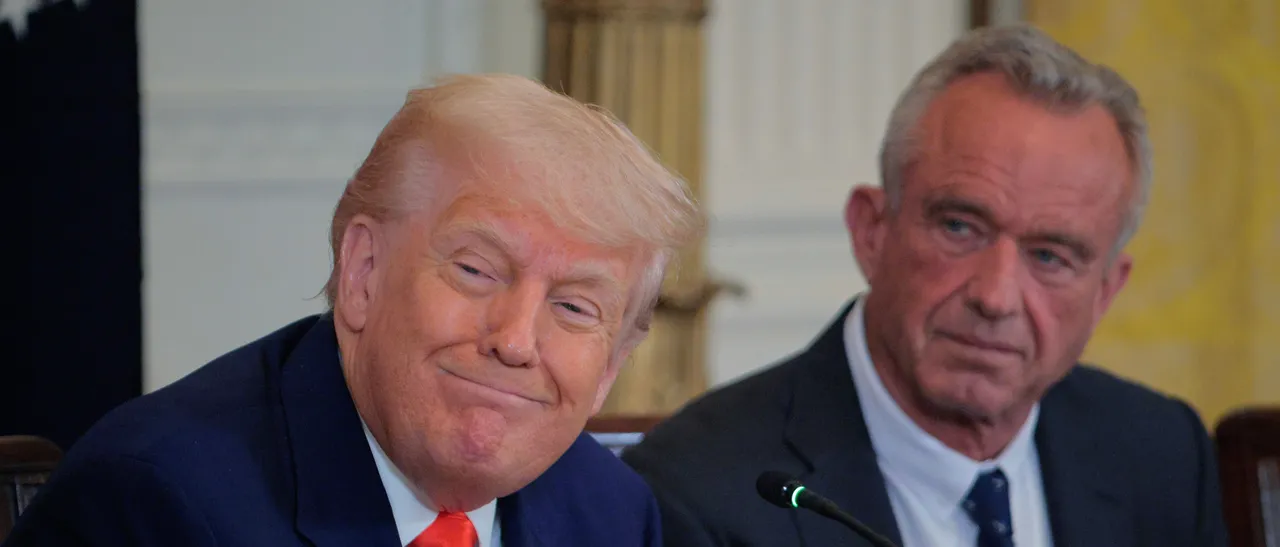President Donald Trump signed a memorandum Tuesday directing the Food and Drug Administration (FDA) to crack down on deceptive pharmaceutical ads on television and social media.
The FDA will simultaneously ship 100 cease-and-desist letters and thousands of warning letters to drugmakers related to deceptive advertising, administration officials told reporters.
The memo calls for the enforcement of regulations already on the books under the Federal Food, Drug, and Cosmetic Act that ban pharmaceutical companies from leaving viewers with misleading impressions and require them to present a fair balance of the potential benefits and the full scope of risks. (RELATED: Trump Admin Unveils Plan To Make America’s Children Healthy Again)
“Pharmaceutical ads hooked this country on prescription drugs,” Health and Human Services Secretary Robert F. Kennedy, Jr. said. “Only radical transparency will break the cycle of overmedicalization that drives America’s chronic disease epidemic.”
“Drug companies spend up to 25% of their budget on advertising. Those billions of dollars would be better spent on lowering drug prices for everyday Americans,” said FDA Commissioner Marty Makary.
“This is really one of the primary responsibilities of the FDA,” one administration official told reporters.
The move falls short of a pledge that Health and Human Services Secretary Robert F. Kennedy Jr. made when campaigning for Trump in November 2024 to ban the ads altogether. Administration officials said on a call with reporters Tuesday that the action is the most aggressive one possible – an apparent reference to legal and constitutional constraints. In 2019, pharmaceutical companies sued the Trump administration on First Amendment grounds to stop a requirement that they disclose prices in drug ads.
Let’s get President Trump back in the White House and me to DC so we can ban pharmaceutical advertising. pic.twitter.com/Qp7fj9xskU
— Robert F. Kennedy Jr (@RobertKennedyJr) November 3, 2024
The move marks the first enforcement action following the release of a 20-page report Tuesday that outlines the roughly 130 policy priorities of the Make America Healthy Again movement.
FDA regulations have long required that pharmaceutical ads cannot deceive potential patients. But the FDA’s enforcement of those rules has withered. In 2023, the FDA Office of Prescription Drug Promotion, which regulates pharmaceutical marketing, sent just one enforcement letter to a company in violation of the law. In 2024, the office sent zero letters. Yet the office responsible for the decline remains well staffed, officials said. (RELATED: Big Pharma Tax Loophole Costs Americans Over $1 Billion Per Year, According To Recent Study)
A 2018 review of social media ads for the 20 bestselling drugs in the U.S. found that they always included the benefits of the drugs but only mentioned the possible harms one-third of the time. Pharmaceutical companies can receive lucrative tax deductions for the costs of drug advertising.

U.S. President Donald Trump and Health and Human Services Secretary Robert F. Kennedy Jr. attend an event introducing a new Make America Healthy Again Commission report in the East Room of the White House on May 22, 2025 in Washington, DC. (Photo by Chip Somodevilla/Getty Images)
Enforcement has been hampered by a loophole introduced in the 1990s called an “adequate provision” disclosure. Drug companies may disclose a drug’s full list of risks, as found in the prescribing information, by asking patients to contact a health provider, toll-free number, a print advertisement or a website, according to the FDA.
Increasingly, drug ads have infiltrated social media sites, with influencers promoting GLP-1s and other pharmaceutical products without the legally required disclosures.
The presidential memo addresses concerns among some physicians that pharmaceutical direct-to-consumer advertising distorts the doctor-patient relationship. The U.S. and New Zealand are two of the only countries in the world that permit direct-to-consumer ads of pharmaceutical drugs that include claims about the drugs’ benefits.
All content created by the Daily Caller News Foundation, an independent and nonpartisan newswire service, is available without charge to any legitimate news publisher that can provide a large audience. All republished articles must include our logo, our reporter’s byline and their DCNF affiliation. For any questions about our guidelines or partnering with us, please contact licensing@dailycallernewsfoundation.org.





![Gavin Newsom Threatens to 'Punch These Sons of B*thces in the Mouth' [WATCH]](https://www.right2024.com/wp-content/uploads/2025/08/Gavin-Newsom-Threatens-to-Punch-These-Sons-of-Bthces-in-350x250.jpg)
![ICE Arrests Illegal Alien Influencer During Her Livestream in Los Angeles: ‘You Bet We Did’ [WATCH]](https://www.right2024.com/wp-content/uploads/2025/08/ICE-Arrests-Illegal-Alien-Influencer-During-Her-Livestream-in-Los-350x250.jpg)
![Black BET Billionaire Donor Stuns Democrats, Gives $500K to Winsome Earle-Sears [WATCH]](https://www.right2024.com/wp-content/uploads/2025/08/Black-BET-Billionaire-Donor-Stuns-Democrats-Gives-500K-to-Winsome-350x250.jpg)







